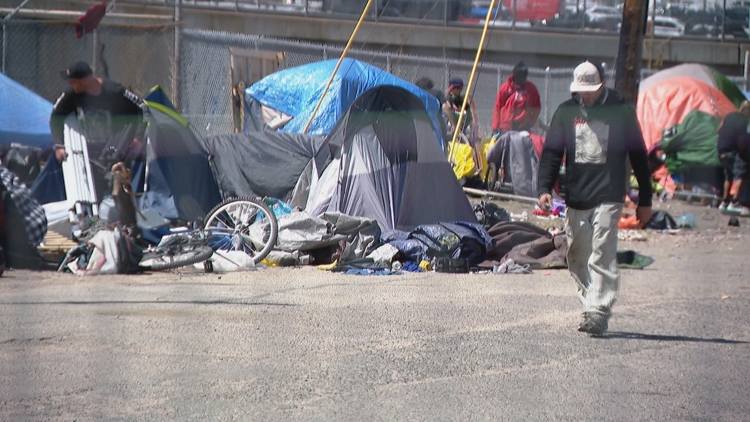[ad_1]

Unsheltered homelessness in the city of Denver dropped 11% in the last year, according to data from the Metro Denver Homeless Initiative.
DENVER — Denver Mayor Mike Johnston is celebrating what his office is calling “significant strides” in reducing the number of unsheltered homeless people in the City of Denver.
Unsheltered homelessness in the city of Denver dropped 11% in the last year, according to data released from the annual point-in-time count conducted by Metro Denver Homeless Initiative (MDHI).
MDHI’s 2024 point-in-time count took place on Jan. 22 and surveyed Adams, Arapahoe, Boulder, Broomfield, Denver, Douglas, and Jefferson counties.
Despite a documented 10% increase in overall homelessness and a 5% increase in unsheltered homelessness across the Denver metro area, the city itself saw improvements in certain populations.
Denver recorded an 83% reduction in unsheltered family homelessness, 23% reduction in tent and vehicular homelessness, and that 11% reduction in the total population of unsheltered people in the city.
According to a release from the mayor’s office, that 11% drop is Denver’s largest single year reduction in unsheltered homelessness since MDHI began documenting county-specific data.
The mayor’s office said the reduction is in line with national leaders on homelessness like Houston, which saw a 12% decrease in unsheltered homelessness from 2023 to 2024.
Denver is ahead of peer cities like Seattle, which has seen a 22% increase in unsheltered homelessness between its two most recent point-in-time counts in 2022 and 2024. Denver is also ahead of Chicago, Washington, D.C., and Atlanta in reducing unsheltered homelessness, according to the mayor’s office.
One of the mayor’s initiatives to reduce tent homelessness, All In Mile High, has closed 17 encampments and sheltered 1,673 people. This led to a 20% increase in the city’s sheltered population, according to the mayor’s office.
As of Aug. 14, the mayor’s office estimates there are 117 tents in the city, which is a 52% reduction from the 242 tents counted in January.
There are caveats to Denver’s success: More than 1,000 people who have been moved off the streets are still in hotels with no permanent housing, and the mayor’s plan is more than $60 million over budget.
More than 350 blocks of downtown Denver have been permanently closed to camping and the mayor’s office said for the first time in several years, there are no large encampments in the downtown area.
The mayor’s office said it also anticipates becoming one of the largest U.S. cities to achieve “functional zero” for unsheltered veteran homelessness by the end of the year, meaning that the number of veterans experiencing homelessness is lower than the average number of veterans exiting homelessness in a month.
Johnston proposed a new tax, the Affordable Denver Fund, that would go toward affordable housing to help fill a gap in much needed permanent housing. The proposal would increase the city’s sales tax by 0.5%, the equivalent to a five-cent tax on every $10 purchase. To get to voters, the proposal must first be approved by city council and make the ballot.
[ad_2]
Source link




